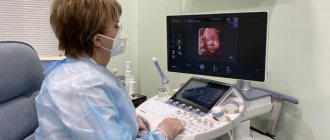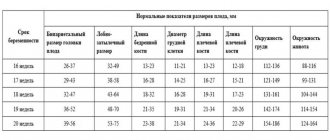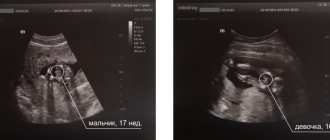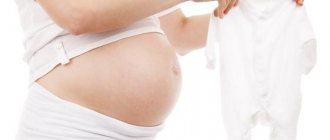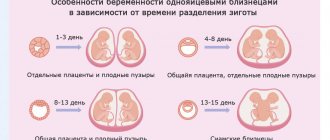What's happening
At week 4, the embryo develops three germ layers:
- Endoderm - responsible for the formation of the lungs, digestive system, pancreas and liver;
- Ectoderm - forms the nervous system, hair, skin, nails, cornea of the eyes and tooth enamel;
- Mesoderm - forms the circulatory and muscular systems, skeleton, heart and kidneys.
Also in the 4th week of pregnancy, important extra-embryonic organs appear: amnion, chorion and yolk sac. The amnion will gradually turn into a sac containing amniotic fluid (also called amniotic fluid). This is a biologically active environment that provides nutrition to the unborn baby, maintains a constant temperature around him and protects him from external influences. And during this period, the umbilical cord is formed, connecting the embryo to the placenta.
The placenta itself is built from chorion and completes its formation by the 12th week. She secretes the hormone hCG, but at this stage its concentration in the urine is still quite low. At the 4th week, a blood test for hCG and an ultrasound will already determine pregnancy, but home tests may not give a 100% result.
The yolk sac is formed on the 15th – 16th day of intrauterine development. It does not function for long - about three months, but is of great importance for the development of the fetus: it participates in hematopoiesis, metabolic processes, the formation of the first germ cells in the unborn baby, plays the role of the “primary liver”, collects fetal secretions and helps to form immunity. For this reason, in the first 6 weeks after fertilization of the egg, the yolk sac is much larger than the amniotic sac along with the embryo.
Fourth week of pregnancy
Just like in the previous week, the development of the placenta and the formation of the vital activity systems of the unborn child continue. By the end of the fourth week, the circulatory system begins to operate, the umbilical cord is formed, connecting the embryo to the placenta, and the rudiments of the upper and lower limbs appear.
In the fourth week, the formation of such important organs as the liver, kidneys, as well as the digestive and urinary systems begins. The future fetus begins to develop eyes and ears. The size of the embryo can be compared to a poppy seed; its weight is about 0.5 grams.
Changes in maternal condition
The fourth week is the most favorable time to take a pregnancy test. Although the second stripe is not yet very distinct, its presence is beyond doubt. Pregnancy can also be confirmed by a blood test for hCG. As for ultrasound, it is not always possible to see the embryo at this stage.
A gynecological examination confirms an enlarged uterus, but this fact is not enough to determine pregnancy, since a slight increase in this organ is also typical in the period before the onset of menstruation. Therefore, to be sure, the doctor will advise the woman to come for a follow-up appointment in two weeks.
The changes in the mother's feelings are the same as in the previous week. The main ones:
- increased fatigue, drowsiness during the day;
- sensitivity to smells and tastes;
- frequent mood changes;
- discomfort and slight pain in the lower abdomen;
- increased appetite or, conversely, its absence, the desire to eat certain foods;
- frequent urination.
At the end of the first month of pregnancy, women begin to experience an unpleasant feeling of nausea, which intensifies in the morning. Nausea can occur as a reaction to food or regardless of food. Sometimes nausea is accompanied by vomiting.
There are many ways to relieve morning sickness. Many women find lemons and other citrus fruits, mints, a little cheese or cookies eaten before getting out of bed helpful.
Many expectant mothers at this stage notice breast enlargement, when the bust suddenly “grows” by a whole size. This is evidence of hormonal changes in the body. But other women note that there have been no significant changes in their breasts.
Recommendations for the expectant mother:
- get rid of bad habits - smoking, drinking alcohol;
- sleep at least 8-10 hours a day, if you feel excessively sleepy, rest during the daytime;
- avoid crowded places to protect against infectious diseases;
- monitor the condition of vaginal discharge - the appearance of copious, foul-smelling discharge indicates the presence of an infection that must be treated immediately, and bloody discharge can warn of an incipient miscarriage;
- if there is no nausea, provide adequate nutrition; in case of severe toxicosis, avoid foods that cause nausea;
- spend a lot of time outdoors, moderate physical activity and sports are allowed;
- avoid stressful situations and negative information.
The behavior of the mother at the very beginning of pregnancy is of great importance for the health of the unborn baby.
How you feel
It is quite possible that at the 4th week of pregnancy there will be no obvious changes in well-being. You may also experience symptoms such as:
- Breast engorgement;
- Sore nipples;
- Nausea;
- Weakness;
- Drowsiness;
- Increased fatigue;
- Irritability;
- Frequent urination;
- Minor pain in the lower abdomen;
- Changes in appetite or taste preferences.
All these symptoms can easily be confused with approaching menstruation, although they may be signs of early toxicosis.
In the 4th week, whitish or clear vaginal discharge is often observed - this is normal. If they have an unhealthy (gray-green, yellowish) color and an unpleasant odor or cheesy consistency, such signs indicate the development of a genital infectious disease, so you should definitely see a doctor. Minor bleeding may also occur.
Baby 3 weeks pregnant
What happens inside you during the 3rd week of pregnancy? The fertilized egg is securely implanted in the uterine cavity. The embryonic stage of fetal development has begun, which will last for 8 weeks inclusive. This is the period of the beginning of organogenesis, when axial structures, cardiovascular and nervous systems are formed; the formation of the heart, adrenal cortex, muscle tissue and internal organs begins; the neural tube (the basis of the brain and spinal cord) and the umbilical cord, the rudiments of the urinary and reproductive systems, the intestinal tube, notochord, vertebrae, ribs, shoulder blades, and skin are formed.
At this time, our embryo looks like a tiny lizard with a barely formed head, a long body, a tail and small processes in the arms and legs. Often the fetus at 3 weeks of pregnancy is compared to the human auricle. In any case, it is no longer a ball with scattered cells, but a single organism, rapidly gaining growth rates. Its protein nutrition occurs with the help of the yolk sac, whose role in delivering to the fetus all the substances necessary for life will be assumed by the placenta by the end of the first trimester. In the meantime, the latter is just beginning to take shape. The embryo receives both the missing beneficial microelements and oxygen from the mother’s blood through the chorionic villi.
If you are not already taking vitamin complexes, now is the time to start doing so. From now until it is born, the baby inside you will “take” a significant portion of your nutrients. Therefore, you need enhanced support in the form of vitamins and minerals, which should be prescribed to you by your doctor.
Risk factors
At the 4th week of pregnancy, spontaneous miscarriage sometimes occurs, which the woman may not notice because she is not aware of her situation. The embryo implantation stage is one of the most dangerous periods in the intrauterine development of the unborn child, because at this moment the embryo is extremely sensitive to everything that happens in the mother’s body.
There are several risk factors that can lead to fetal rejection or disruption of fetal development:
- Various diseases (acute respiratory infections, chickenpox, rubella, herpes, toxoplasmosis, etc.);
- Bad habits of the mother (smoking, drug or alcohol use);
- Difficult or harmful working conditions;
- Work associated with increased injury;
- Taking certain medications.
Therefore, if you planned your pregnancy in advance, during this period be extremely careful and attentive to your health.
Risks in the early stages of pregnancy
According to medical data, the period between the 20th and 28th day of gestation is the most dangerous for the expectant mother. It is during this period that the risk of spontaneous abortion and miscarriage increases. During IVF, the body is adjusted to carry a fetus artificially with the help of maintenance hormonal therapy. Therefore, even the slightest fluctuations in hormonal levels can lead to fetal fading.
In some cases, an ultrasound at 20 DPP shows that the embryo has attached to the wall of the fallopian tube rather than the uterine cavity. In this case, an ectopic pregnancy is diagnosed, which must be terminated. To preserve the fetus and prevent complications, you must follow several important rules:
- Within 2-3 months after successful conception, you need to be observed in the clinic where the IVF procedure was performed;
- During the first month after conception, it is necessary to strictly monitor the level of progesterone in the blood;
- You should take vitamin-mineral complexes and hormonal medications prescribed by a specialist to maintain normal hormonal levels;
- Before the first ultrasound, it is advisable to abstain from sexual intercourse in order to avoid hormonal fluctuations;
- It is necessary to avoid excessive physical activity and stressful situations, which can affect the psycho-emotional state and provoke an increase in uterine tone.
Recommendations
Perhaps only now you are thinking about whether you should take vitamins. There is probably no clear answer to this complex question. If you live in your own home, you have a wonderful opportunity to get fresh vegetables straight from the garden and enjoy an abundance of seasonal fruits and berries, then there is no need to take multivitamin preparations. But if you are a city resident and you don’t always have the “correct” environmentally friendly products on hand, the best way out of the situation would be to take a vitamin complex.
Science has proven that by taking vitamin B9 (folic acid) in the early stages of pregnancy, the expectant mother reduces the risk of developing defects in the fetus. And if you start taking this vitamin before conception, you can prevent spontaneous miscarriage, ectopic pregnancy and other unpleasant phenomena.
Are you prone to anemia? Be sure to eat iron-containing foods (meat, beef liver, eggs, etc.). If you cannot increase hemoglobin in this way, take iron separately or as part of a vitamin complex.
If you are already aware of your situation, try to get enough rest. Enjoy walking in the fresh air, pay attention to your emotional state. Remember that taking care of yourself is nothing more than taking care of your baby. And you shouldn’t take on a lot of household responsibilities. It would be ideal if the future father now takes on the main chores.
What will an ultrasound show?
In the early stages, a transvaginal ultrasound of the pelvis is performed (when the sensor is inserted into the vagina). It is not necessary to fill the bladder as before a transabdominal examination. However, the day before you should not eat food that increases gas formation; on the day of the study, you need to empty your intestines. Compliance with these simple requirements will allow the doctor to better examine you.
A fetus at 4 weeks of gestation in an ultrasound photo looks like a bright dot against the background of a dark spot (gestational sac). The outlines of the baby are not yet visible, but the presence of this point is a good sign: the pregnancy is developing. Another important confirmation of the new life within you is the sound of your heartbeat. Typically, the heart can be heard during a transvaginal ultrasound as early as 4-5 weeks of pregnancy, with a transabdominal ultrasound at 6-8 weeks, and with a stethoscope at 18-20 weeks. At first, the heart rate is 80-84 beats per second, by 20 weeks it will increase to 140-160.
If in the fourth week of pregnancy there is no heartbeat and no embryo is found in the gestational sac, the doctor will suggest repeating the study after 7-10 days to rule out anembryony (absence of an embryo in the fertilized egg).
Unfortunately, at this stage, using an ultrasound, you can only check the condition of the uterus, cervix and other pelvic organs, confirm the development of pregnancy or suspect an ectopic one.
It will not be possible to identify serious pathologies of fetal development (for example, Down syndrome). Only at 10-14 weeks will the doctor be able to assess the coccygeal-parietal size, determine the thickness of the nuchal translucency, check the presence of the nasal bone, and look at the structure of the chorion. If there is the slightest suspicion of a deviation from the average statistical readings, additional studies will be ordered. Now the gynecologist can only check whether the fetal heart rate is normal.

